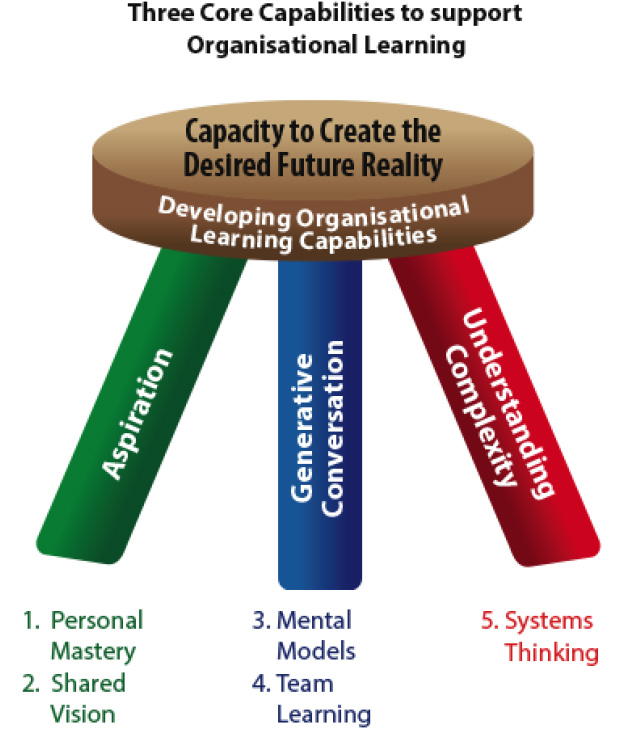
Click on the video below to learn more!
The Three-Legged Stool
The stool represents the interdependence of three core capabilities to support organisational learning (Aspiration, Generative Conversation and Understanding Complexity) that will help an organisation build the capacity to create the future or results it truly desires. The core of learning organisation work is based on the five "Learning Disciplines".
Aspiration Capability
The Aspiration Capability focuses on developing a clear sense of purpose and shared vision at both the individual and organisational levels. The Capability includes the OL disciplines of Personal Mastery and Shared Vision. The discipline of Personal Mastery is about having the Capacity to articulate personal visions, comparing with current reality and moving towards a personal vision. The discipline of Shared Vision is about building a shared picture of a future SAF that everyone cares about creating together.
Personal Mastery
This OL discipline involves formulating a coherent picture of the results people most desire to gain as individuals (the vision), juxtaposed alongside an honest assessment of current reality. Cultivating the tension between vision and reality can provide drive and energy to sustain the SAF Leader's capacity to change, and clarity of vision helps them make better choices to achieve more of the results they have chosen.
Shared Vision
This collective OL discipline establishes a focus on shared purpose of the group. The SAF Leaders nourish a sense of commitment in their team or unit by developing shared images of the future they seek to create, and clarifying the principles and guiding practices by which they can reach the desired future.
Generative Conversation Capability
The Generative Conversation Capability is centred on expanding the SAF Leaders' Capacity to be more reflective in their thinking and becoming more generative-oriented. The Capability includes the OL disciplines of Mental Models and Team Learning. The discipline of Mental Models helps the SAF Leaders be aware of underlying assumptions in becoming more reflective and conscious about perceiving the world and taking actions. The discipline of Team Learning requires the SAF Leaders to see how certain habitual patterns of interacting with others prevent them from learning to design strategies that can enhance a team's ability to produce extraordinary performance for the organisation.
Mental Models
This OL discipline of reflection and inquiry is focused around developing awareness of the attitudes and perceptions that influence beliefs and shapes the interaction between individuals or groups. By continually surfacing, reflecting upon and reconsidering these internal pictures of the world, the SAF Leaders gain capability in governing their own actions and decisions.
Team Learning
This is an OL discipline of group interaction and engaging in quality conversations. Through reflective and generative dialogue, as well as balanced discussions, teams can harness their collective thinking and mobilise the team's energies more productively, avoiding unproductive, mismanaged disagreements and emotional breakdowns.
Understanding Complexity Capability
The Understanding Complexity Capability emphasises internalising perspectives and skills that allow the SAF Leaders to better understand and manage the systemic interconnections that produce complex organisational dynamics. The Capability includes the OL discipline of Systems Thinking that provides a language and a set of tools for making the complex dynamic relationships of a system more explicit so that the SAF Leaders can identify the high leverage points for taking action.
Systems Thinking
This OL discipline allows the SAF Leaders to take on complex issues in the organisation. The complexity can be of a technical nature where time delays between cause and effect masks the inter-relationship, as well as a social nature where individuals/groups hold divergent mental models towards the issue at hand. Systems Thinking gives insight into the behaviour of feedback and interdependencies. A good grasp of the Systems Thinking discipline brings together the other four OL disciplines to help the leader anticipate the tendency of the system towards continued growth, and highlight scenarios where the result will oscillate around the pre-change state, or lead to a worse-off situation over time.
Additional Resource(s) Here: